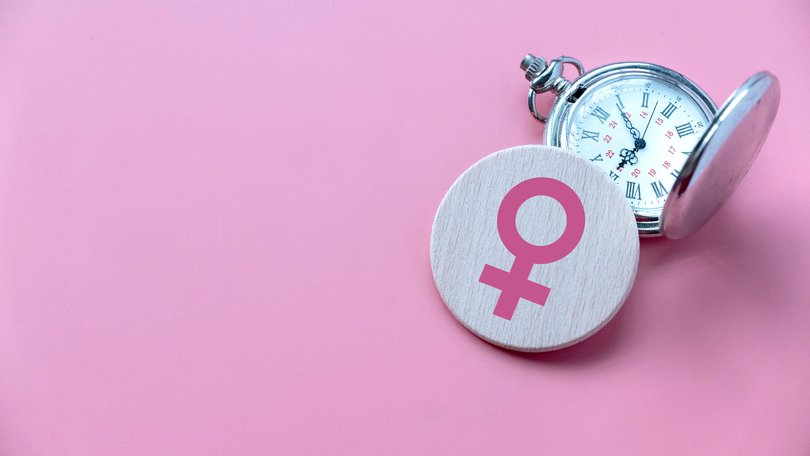SARAH DI LORENZO: It’s time to talk about the trending ‘taboo’ topic of menopause
SARAH DI LORENZO: Here are my top five facts you need to know about menopause.

I feel like menopause is really having a moment, now more than ever before.
Women now are so much more open about their experiences, there are so many more articles and a recent surge in books.
I get so many emails from people asking me to write a book on menopause.
Sign up to The Nightly's newsletters.
Get the first look at the digital newspaper, curated daily stories and breaking headlines delivered to your inbox.
By continuing you agree to our Terms and Privacy Policy.Think about how far women have come. Once talking about menopause and periods was taboo. It was probably around the 1970’s there was a shift and around 2010 conversations opened up.
This change has come about with education, celebrities sharing their journeys, social media and changes in the workplace.
I can definitely say my influx of menopause and perimenopause patients has increased in the last 5 years.
So what are my top facts you need to know about menopause?
It is hard to narrow down but I want to start by saying I try and encourage women to embrace rather than fear menopause, as it is inevitable for all women.
I love cultures like Maori women, who see menopause not as a loss but a transition into leadership and wisdom. How good is this!
Firstly menopause is official when a woman has had 12 months without a period. The average age for this is 51.
Perimenopause however, can begin several years before menopause, with fluctuations in progesterone levels and oestrogen, with irregular cycles as the first sign.
During menopause, some (not all) women experience vaginal dryness, mood swings, irritability, insomnia, night sweats, hot flushes and in some cases anxiety. I do also know women who have no symptoms at all, just finish menstruating and that’s it.
Probably the most common symptoms are the hot flushes which impact around 75 per cent of women.
These flushes last for a few minutes and women report sweating and feeling the surge of the flush rising.
As for the night sweats, they will disrupt sleep and can mean changing sheets, sleeping on towels and a desperate need for air conditioning.
Vaginal dryness is a direct result from the decreased oestrogen. Hormonal changes changes can also cause anxiety, depression and moodiness.
One of the best bits of advice I can give is to understand that menopause can be a real challenge but it is manageable.
What women eat and drink can impact their degree of menopause.
Foods to avoid are spicy foods, alcohol, sugary processed foods and limit caffeine intake. Change the diet to real whole foods, lots of water make sure you are exercising daily.
When I see women make these changes in my clinic their menopause symptoms reduce significantly.
Women opt for different therapies to help their journey and one thing I do know is that all women have a different experience. Some women benefit from HRT (hormone replacement therapy) and others can respond well to changing their diet and lifestyle. Others just need some mental health support.
Something that many women need to be aware of is the long term health aspects like a reduction in bone density, so a diet high in calcium and vitamin D is essential. I tell all my menopause patients to get a bone density test in their 50s, and not to wait until they are 65.
Oestrogen helps to protect the heart, and as menopause is related to loss of oestrogen, women need to live heart healthy by maintaining a healthy weight, exercising daily and eating heart-healthy foods.
One of the most distressing aspects of menopause to so many women is weight gain. The changes in hormones can, in some people, slow metabolism and lead to weight gain around the abdomen. This is where daily exercise, eating healthy and portion control are key.
Another thing women need to understand is that HRT is not for everyone. While for some it is a game changer replacing the oestrogen that the body no longer produces, therefore reducing all the menopause symptoms, others do not have the same experience. Risks can include blood clots, stroke and in some cases an increased risk of breast cancer.
There are so many other options and some incredible supplements you can get, I have had huge clinical success with top quality supplements.
One of the best bits of advice I can give is to understand that menopause can be a real challenge but it is manageable.
Seek help, talk to your doctor, chat to your friends and ask for support if you need it. Educate yourself so you can make informed decisions, find ways to manage stress and moods plus look for the right support you need.
My final thought is that menopause is natural and the transition does not have to be as hard as you may think or fear. Knowing that all women have a different experience can make women stop comparing themselves with others. Look for what is right for you, be proactive and the transition will be a lot easier.

